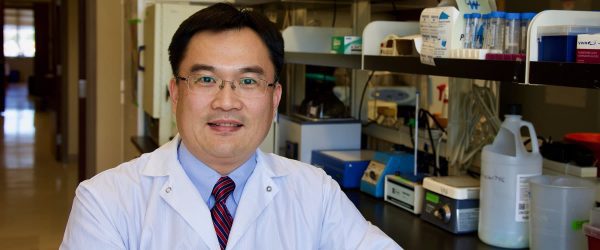Biologist receives prestigious NIH R01 research grant

Shan Yan, an associate professor in the Department of Biological Sciences, has received a $1.7 million R01 research grant from the National Cancer Institute at the National Institutes of Health. Findings are expected to offer insight into how cancers develop and to open avenues to new therapeutic strategies, especially with pancreatic cancers.
Yan’s lab researches DNA damage that human cells sustain each day from internal and environmental assaults. Oxidative DNA damage and single-strand breaks, or SSBs, in the DNA duplex are critical challenges to genomic stability and can lead to the formation of tumors when the body does not repair the damage quickly or properly.
An elaborate network called DNA damage response pathway detects these abnormal DNA structures through a process called checkpoint signaling and coordinates the repair and activation.
The processes by which this signaling and DNA repair take place are still only partly understood because of their complexity and speed and the difficulty of studying complicated interactions within living cells. Additionally, little is known about how cells sense the unrepaired, oxidatively damaged DNA in the first place.
A better understanding of how the body senses oxidative stress signals for a checkpoint response could offer insights into how cancers and neurodegenerative disorders develop following oxidative stress. This knowledge could ultimately lead to new treatments via modulation of the underlying molecular mechanism.
The five-year grant (NIH R01CA225637) Yan’s lab has received will support the continuation of its study of the mechanism of a repair protein called APE1 in DNA damage response. While APE1 is known for its critical functions in base excision repair and transcriptional regulation, it is currently unknown whether APE1 plays an essential role in DNA damage response pathway.
“In particular, this support from the NIH will drive the new direction my lab has started, to look at single-strand breaks and repair, and signaling, as we try to figure out the molecular details of how that works,” Yan said. “We hope we can come up with new methods for cancer treatment or the treatment of aging-related neurodegenerative diseases in the future.”
Using innovative biochemical and structure-function analysis in egg extracts from Xenopus – a genus of highly aquatic frogs – and mammalian cells, the Yan lab intends to demonstrate how the damage is recognized and processed. Target proteins found in Xenopus are correlated with those found in cancer patients. The researchers will validate the findings from the Xenopus system in mammalian cells, including pancreatic cancer cells.
Yan and other researchers from his lab, including students and post-doctoral fellows, have published several peer-reviewed papers documenting earlier findings. One of the most recent papers, “APE2 promotes DNA damage response pathway from a single-strand break,” was published in January 2018 in the journal Nucleic Acids Research (Oxford University Press).
The research project grant (R01) is the original and historically oldest grant mechanism used by NIH to provide support for health-related research and development. The Yan lab also has been supported, in part, by grants from the NIH/NIGMS (R15GM101571 and R15GM114713) and funds from UNC Charlotte (Duke Energy Endowment Special Initiatives Fund and Faculty Research Grants).